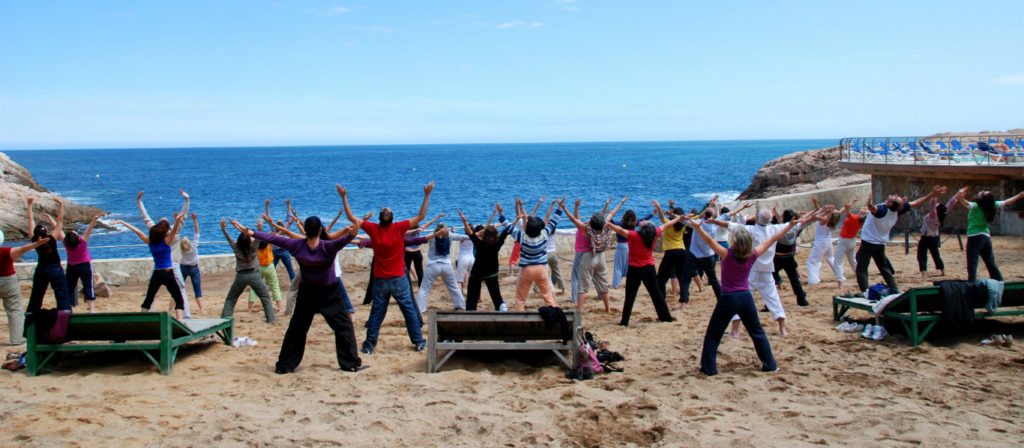ENERGY EMBODIMENT PRACTICES
KUNDALINI BREATHING EXERCISE
MM – Recorded From The Week One Morning Kundalini Breathing Segment
LAKOTA ENERGY DANCE MOVEMENT SEQUENCE
MM – Life Force In Motion – With the Four Directions and Mantras
___
Embodiment Practices for PSEN
A brief yoga video by Joana Carvahlo with the Moon and Sun Salutations.
This video is aimed to support you in slowing down and growing down.
___
Mindfulness Meditation Practices for PSEN
Knowing others is intelligence;
Knowing yourself is true wisdom.
Mastering others is strength;
Mastering yourself is true power.”
– Tao te Ching
Developing A Regular Mindfulness Practicum Curriculum
In our PSEN training program, we cannot emphasize enough the value and power of the facilitator’s presence in our work with our clients. Presence does not just happen, it is a cultivated skill, which needs to be developed and practiced.
Mindfulness is by far the most powerful tool to strengthen our sense of presence.
However, occasional sitting meditation will not do the job, if you want to deepen your presence. We do not become good at anything by reading the instruction manual.
The mastery of any skill requires a commitment to regular practice. This is also true for the practice of mindfulness. A regular mindfulness practice has shown to have many benefits, in addition to the deepening of our presence as a practitioner.
A daily mindfulness practice keeps our brain healthy and fit, and our mind resilient and available to approach challenges in the here and now, rather than avoiding them. This is an essential life skill as well as an essential skill for us as PSEN practitioner.
With regular practice, mindfulness becomes a trait etched in our personality, one that enhances our ability to attune self and others. Mindfulness fosters greater resilience and acceptance of our lived experience, giving us the ability to approach challenges consciously and with more ease.
According to brain researcher Daniel Siegel, these traits involve a set of nine middle prefrontal functions that include regulating our bodies, attuning to others, having emotional balance, calming fear, pausing before acting, having insight and empathy, being moral in our thinking and our actions, and having more access to intuition.
With a regular mindfulness practice we also become less judgmental. We develop more equanimity, become more available to our internal world and develop clearer self-observation. We also enhance our ability to be available for the world around us. We enhance our ability to rejoice in a flower, in the presence of another, in one’s experience in the here and now, as it is.
In addition, mindfulness plays an essential role in neural integration; it links up different parts of the brain. “When a system becomes integrated, it is the most flexible, adaptive, coherent, energized and stable.” (Siegel). Integration favors the harmonious flow of a receptive state where we feel joined with others. Integration is the heart of presence.
For PSEN practitioners, our work with mindfulness will always have two sides of focus, both on our own integration and on that of our clients. Through our own integrated and mindful presence we can support the growth of our clients towards integration.
Part of our work as PSEN practitioners is to help our clients find ways to move from reactivity, chaos and rigidity into a more integrated state of being, where they can find resilience with their past and present experience, and can learn to see their reality from a larger perspective. This is much more likely to happen if we have this kind of resilience available to ourselves as practitioners as well.
We have divided your mindfulness practice into four segments over the course of this training year. These segments aim at deepening your general practice of mindfulness and embodiment, while including a useful way of applying self-inquiry into the nature of certain themes discussed during the training year.
In our PSEN Training Program we see mindfulness a core value worthy of daily practice, which enhances our capacity to understand and apply certain process teachings in our work as practitioners, such as slowing down and working at one’s developing or learning edge.
Many of our PSEN practice exercises to cultivate mindfulness are inspired by the work of Daniel Siegel and Jon Kabat-Zinn.
For those of you who want to deepen your intellectual understanding and linking of brain science and mindfulness practice, we recommend Daniel Siegel’s books “The Mindful Therapist” and “The Mindful Brain”.
We also recommend Jon Kabat-Zinn’s book “Full Catastrophe Living”, where he explains his working method successfully used in his stress reduction clinic.
We encourage you to take up a mindfulness practice up and make it your own!

